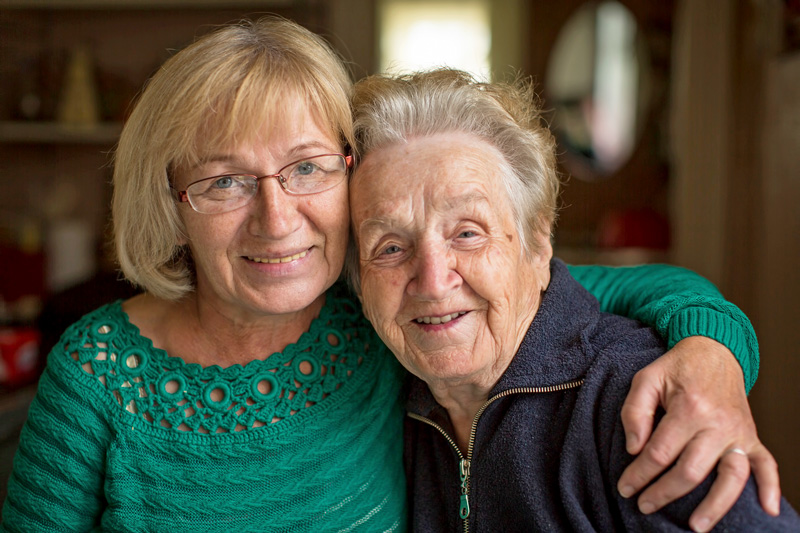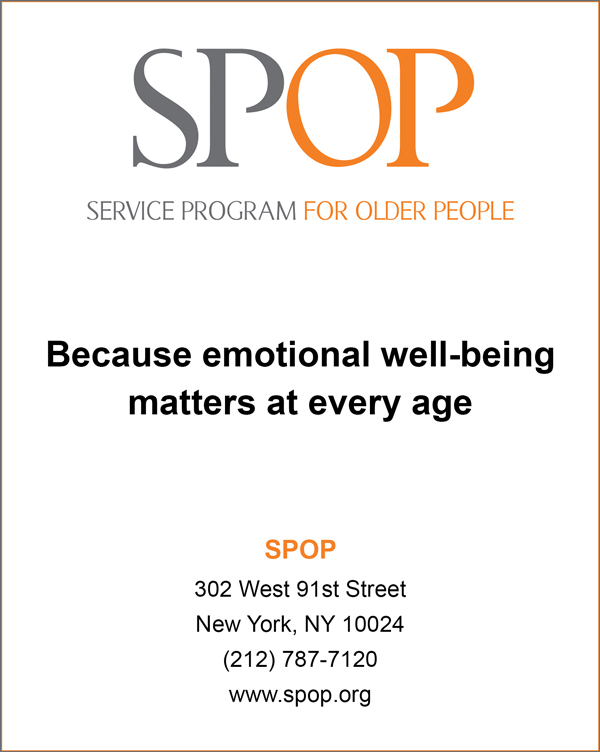It is with great excitement that I step into the role of CEO of Service Program for Older People (SPOP), a position I assumed on July 1 following the retirement of our long-time CEO, Nancy Harvey. It is a tremendous honor to be entrusted with the leadership of an agency that has transformed the lives of older New Yorkers for nearly 40 years.

I entered the field of aging and behavioral health when I was 19, working as a member of one of the only mobile behavioral health teams for older adults in New York City. I loved the work and never really strayed far from it, as I gained my MSW from Hunter College School of Social Work and pursued opportunities in various settings, including hospitals, long-term care administration, and aging services providers. I have served as Chief Program Officer at SPOP since 2016, and I look forward to sharing my thoughts on aging and behavioral health in this column.
Located in New York City, SPOP is one of only a handful of agencies in the country entirely dedicated to community-based behavioral healthcare for older adults. I view SPOP as a true pioneer in the field and a model for how other cities and communities can support the well-being and independence of older adults. We serve some 1,000 older New Yorkers each year, and our Clinic and PROS program (the only one for older adults in New York State) offer individual and group therapy, psychiatry, medication management, assessments, psychiatric rehabilitation group support, and linkages to other agencies and organizations that provide services to support aging in place. Much of our work is now done by telehealth, which has been a valuable tool for clients who are managing transportation challenges, frail health, or mobility impairment.
Throughout my career, one of the most profound lessons I have learned – and continue to learn every day – is that there is nothing “generic” about aging. Our client population spans at least four decades and reflects the economic, ethnic, racial, and gender diversity of New York City. Each client brings a long and complicated history to the process, and we aspire to listen without any preconceptions about aging, race, ethnicity, sexual orientation, gender expression, or financial status.
The most common diagnoses that we see in our clinic are depression and anxiety, though we also treat clients for a multitude of other presenting issues. Social isolation, economic insecurity, caregiver distress, chronic illness, and alcohol or substance misuse have always been contributing factors to our clients’ well-being, and all of these became much more acute during the pandemic.
Our team of mental and behavioral health professionals all have deep expertise working with adults over age 55, and many identify as LGBTQA+, people of color/multiracial, bilingual, or having lived experience as an older person or mental health consumer. To a person, they bring an extraordinary dedication to their work, which translates to a 97% satisfaction rate among our clients.
Resiliency is the word that comes to mind when I think about the SPOP community. Yes, each client becomes older while they are at SPOP (as have I!), but they also learn, grow, and change during treatment. We strive to create an environment that is free of negative stereotypes about aging as we encourage clients to focus on their strengths, not on their chronological age, and work toward new goals.
Each year, I see our clients – some well into their 90s – achieve sobriety after decades of alcohol or substance misuse, learn to understand and resolve grief after the loss of a partner or acquire self-regulation skills to manage symptoms of anxiety or depression. Others have resolved deep-seated emotions rooted in trauma or abuse, found ways to define and celebrate holidays in meaningful and joyous ways, or learned how to acknowledge the challenges of chronic illness and how to accept assistance from others. Our clients – and our therapists, psychiatrists, schedulers, receptionists, and intake staff – are an unending inspiration for me.
Older adults are the fastest-growing population segment in much of the country. We know that behavioral healthcare can play a role in improving their overall well-being, reducing social isolation, and increasing their independence. We also know that greater independence can translate into reduced expenses for everyone.
I hope that we can expand this conversation about aging and behavioral health and work together to eliminate negative stereotypes and increase access to services and treatment for all ages. Please reach out to me at cthurston@spop.org with your ideas about how to support the resiliency and well-being of our older friends, neighbors, and family members.
Visit www.spop.org to learn more about SPOP and its work as a community-based behavioral healthcare provider for older adults in New York City.
Catherine Thurston, LCSW, was appointed Chief Executive Officer of Service Program for Older People (SPOP) in July 2024, having previously served as Chief Program Officer for eight years. She has over 35 years of experience in gerontological social work, including serving as Chief Services Officer at SAGE/Service & Advocacy for GLBT Elders and as Director of Alzheimer’s Programs at the Cobble Hill Health Center. Catherine has published in the areas of Dementia and Long-term care and LGBT Aging and has sat on the New York State Caregiving Coalition, AARP’s Caregiving Committee, and the American Society on Aging’s LGBT Aging Network. She has served as Adjunct Faculty at the Silberman School of Social Work at Hunter College since 2016. She received her Master of Social Work from Hunter College School of Social Work.





